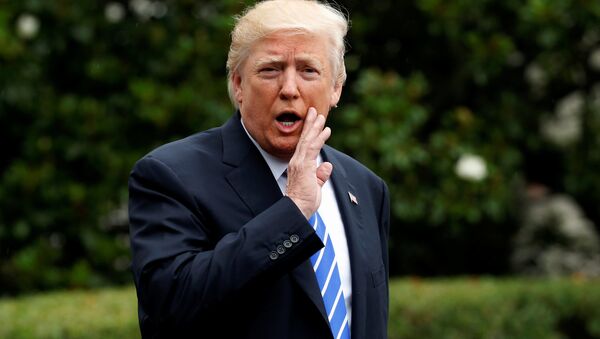Russian Prime Minister Dmitry Medvedev on Wednesday characterized the new US anti-Russian sanctions bill signed into law by President Donald Trump as a declaration of "full-fledged economic war." Medvedev also said now there was no hope for making Russia's relations with the new US administration better. Yet, Nauert contended "there is always hope for improvement."
On Thursday, Russia's Ambassador to the United Nations Vasily Nebenzya said during a UN Security Council meeting that sanctions should not be used for economic reasons but only as a tool for resolving crises.
EUROPE’S DILEMMA
European leaders now had to make the decision whether they would defy the US law to protect the prosperity and interests of their own people or bow down before Washington, affairs analyst and political commentator Dan Lazare told Sputnik.
"The real question concerns how the EU will respond to this one-sided diktat," Lazare said. "Will it bow down to US imperialism or stand up for its own rights?"
German Chancellor Angela Merkel and her senior ministers had indicated they were highly critical of the new sanctions law, which targets the Nord Stream 2 energy pipeline cooperation between Europe and Russia.
However, new French President Emmanuel Macron and United Kingdom Prime Minister Theresa May were both eager to court Washington’s favor, and they could count on the support of traditional anti-Russian countries in Eastern Europe, Lazare pointed out.
"With the Baltics and Poland consumed by anti-Russian hostility and May and Macron tilting to the US, the effect is to heighten Merkel's isolation and vulnerability," he cautioned.
The mounting crisis would pose an acute dilemma for Merkel, Lazare predicted.
"Will Germany surrender to the US as [it] escalates tensions on [the] eastern flank while gobbling up the energy sector? Or will it finally stand up to Washington and just say no? To me, that's the big question before us," Lazare said.
The new sanctions law also demonstrated how Republicans and Democrats were competing to determine which one of them was the most outrageously imperialist party on Capitol Hill, Lazare observed.
"The legislation's attacks on the NordStream 2 pipeline are a thinly veiled bid to shut out a competitor and muscle in on the EU energy sector itself," he emphasized.
The sanctions law also applied double standards by attacking Russia for protecting its interests and those of its allies across Eurasia while ignoring the long US record of toppling governments, violating national sovereignty and imposing its dictats on far more countries, Lazare said.
Washington’s "fulminations against Russia for its actions in the Ukraine, Abkhazia [and] Transnistria are outrageously one-sided in their failure to mention repeated US violations of national sovereignty from the Balkans to Iraq, Libya, and Syria," he stated.
California State University Professor Emeritus of Political Science Beau Grosscup told Sputnik that powerful US political and economic interests were trying to force a major new confrontation with Russia.
"Congress went after Russia… to test the President’s loyalty to his own country. But [this is] secondary to the fact that powerful Congressional Republicans and Democrats on behalf of the military-industrial complex, are itching for a New Cold War with now capitalist Russia," he said.
The US appetite for confronting Russia had alarmed German leaders and other Europeans, Grosscup explained.
"This has Europe and Germany in particular very much on edge, as once again they will be required to sacrifice their economic interests more than the US, as well as being cannon fodder should the US-instigated New Cold War become a shooting war," he said.
The new anger and concern generated by the latest US legislation was driving a new divide between Europe and the United States, Grosscup observed.
"Thus their [European] ferocious and very public opposition to the Russian part of the [US] sanctions bill, further driving a wedge between a Merkel-led Europe and the Trump Administration," he said.
Grosscup also noted that the new sanctions bill was tailored to provoke confrontations with Iran and North Korea as well.
"Sanctions on Russia have gotten most of the attention due to Trump’s reticence to sign off on them and European opposition. But the bill includes further sanctions on Iran and North Korea, two countries on Trump’s enemies list," he said.
"More sanctions on Iran are particularly peculiar since weeks ago Trump reluctantly ratified that Iran was in compliance with the Obama-negotiated and multi-party Joint Plan of Action treaty," he said
Since then Trump has ordered his national security chiefs to come up with some minor violation to justify attacking Iran in October, Grosscup added.
Russian Deputy Foreign Minister Mikhail Bogdanov said the new US sanctions against Russia were "absolutely illegitimate" and did not contribute to the development of trust between Moscow and Washington.






